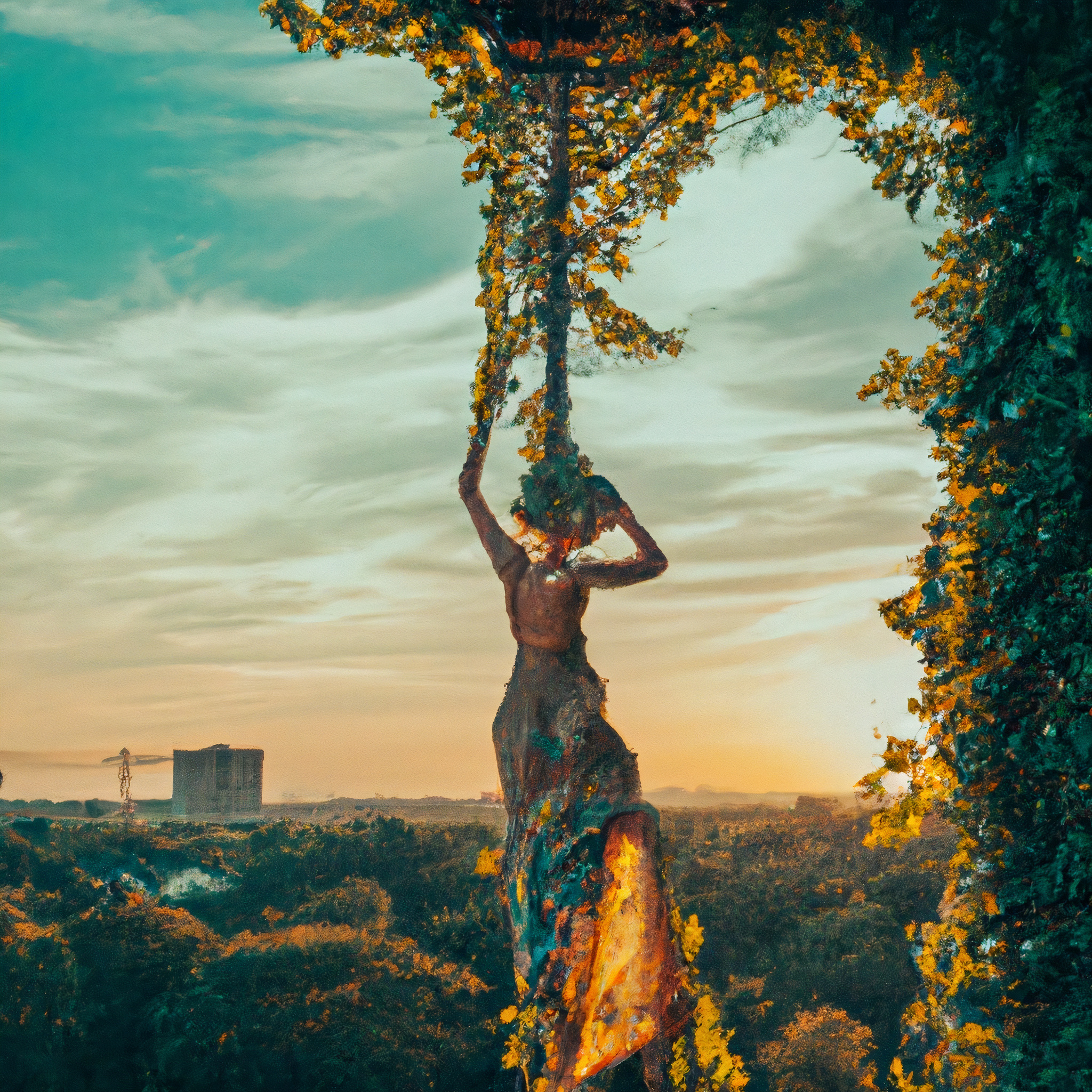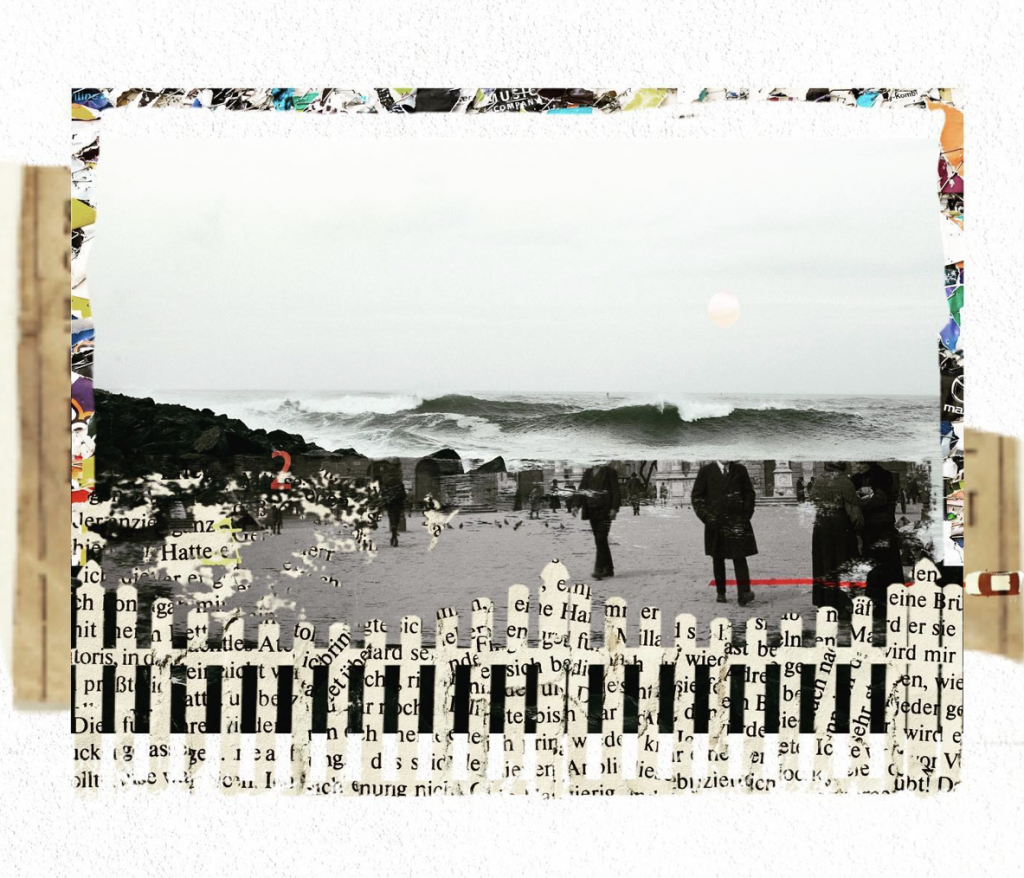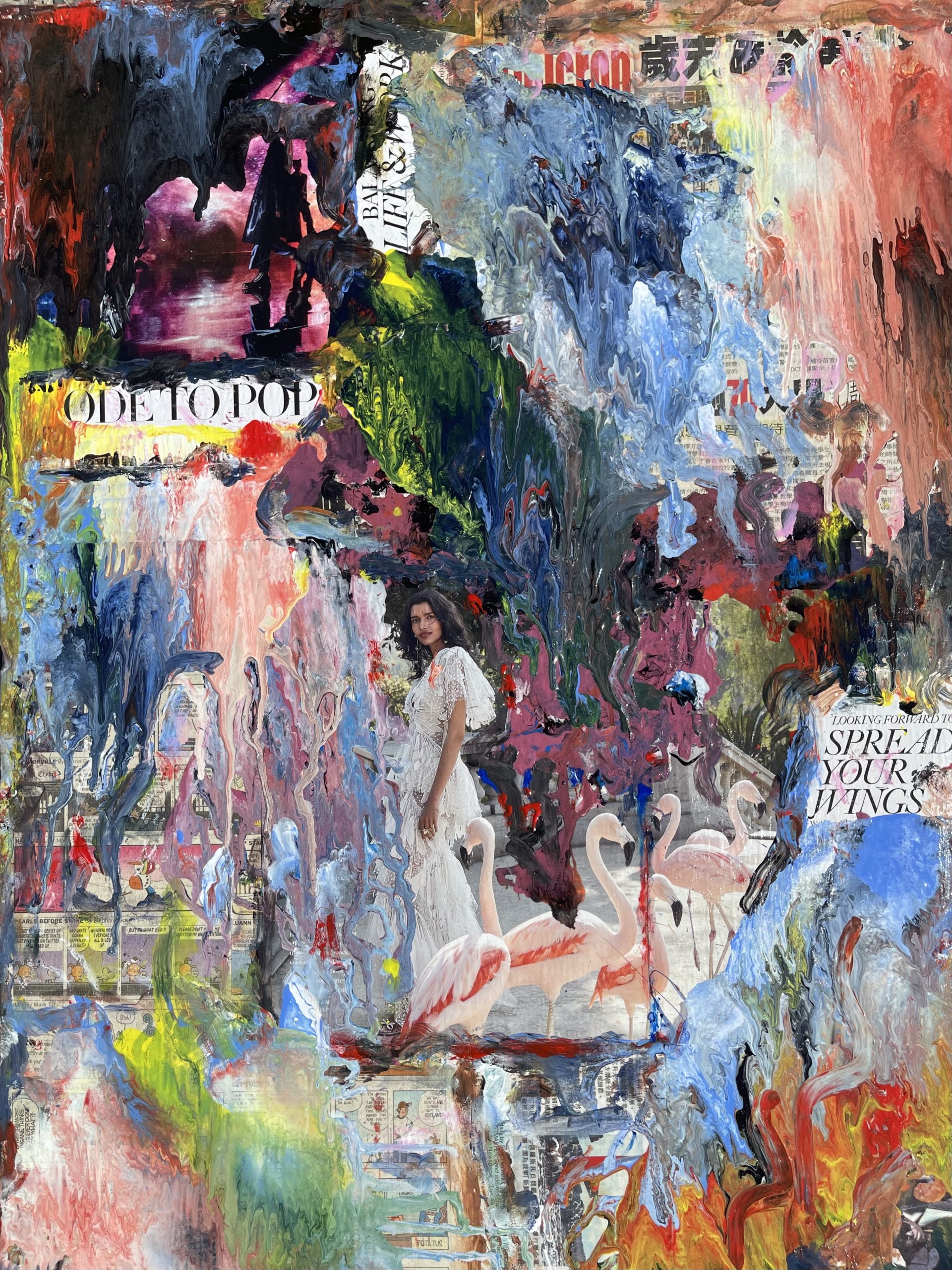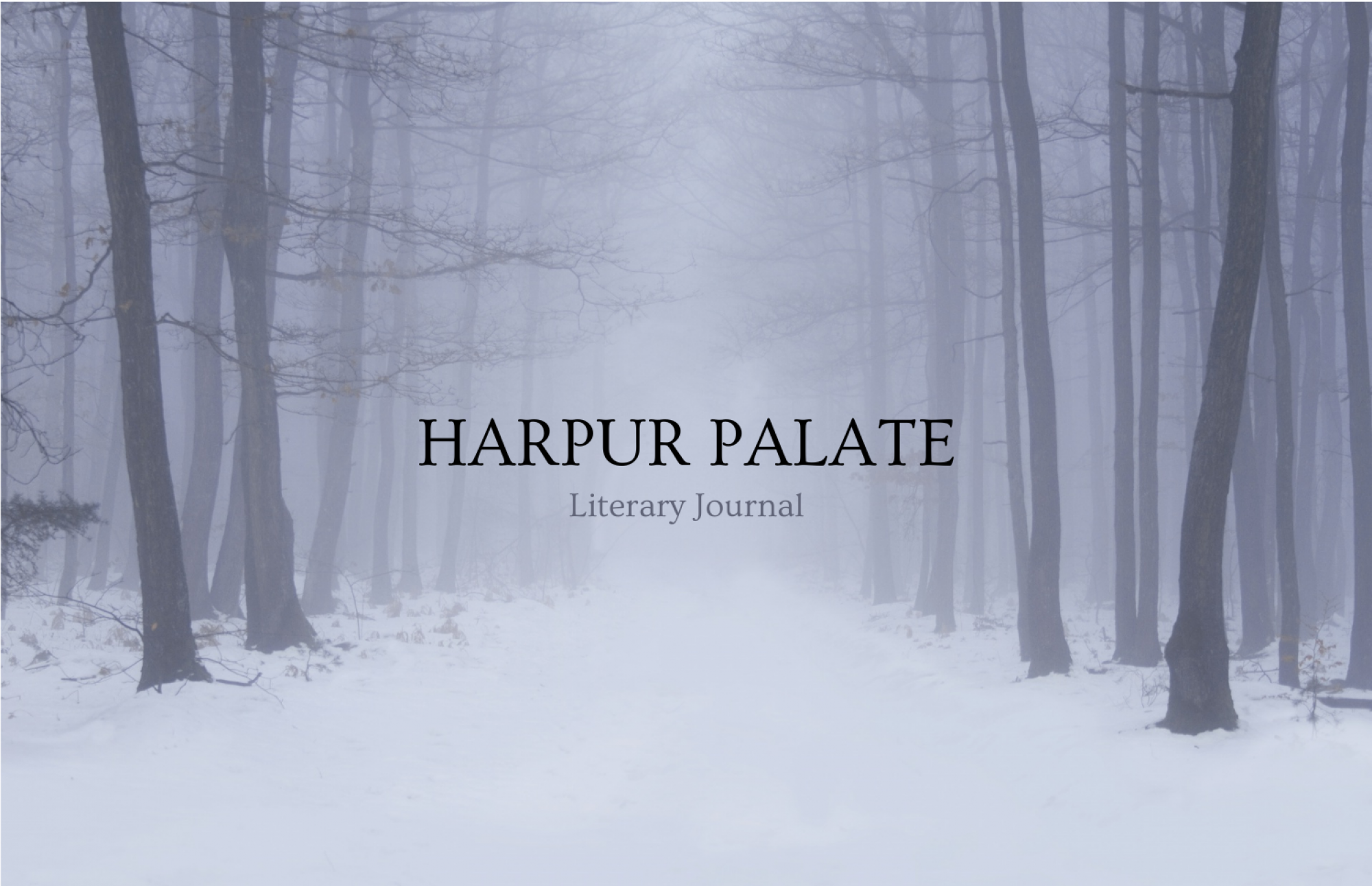
FROM THE EDITOR
“If all insects on Earth disappeared, within 50 years all life on Earth would end. If all human beings disappeared from the Earth, within 50 years all forms of life would flourish.”
–Jonas Salk, American virologist and biomedical scientist
The deep future is a black box. With massive environmental changes to our world every decade it is difficult to fathom what Earth will look like in fifty years, let alone five-hundred. However, it is this task, the artist’s calling, to help fill our collective psyche with hopeful imagery to hold onto beyond the all-too-easy symbol of apocalypse. Survival is brilliant. And five mass extinction events thus far have proven to be insufficient to blot it out. Instead, these wonderful creators in Special Issue: Ecotopia present a vision of an ecocentric and sustainable future on Earth that celebrates the human and more-than-human world. Though, this coexistence is not without transformative grief and radical change to where we fit in as a species.
The horizon is where we gaze, falling victim to the illusion that it is the sun, and not us, who moves. Whether Austin Lubetkin’s artwork faces the East or West is up for the viewer to decide. Through its allusion to Casper David Freidrich’s “Wanderer above the Sea of Fog,” “Horizon” places us behind a new being, a woman in a dress, in suspended dance, whose head molds into what appears to be a lamppost, hands and hair tangled (or becoming?) ivy. Rather than symbolizing the intellect above the Earth, this work fuses the human with ecology and industry–a hybrid creature hanging. Even the “crane” in the distance has become organic, its steel neck like decomposing rope, its arm more cloud than metal.
Similar to “Horizon,” Ana Prundaru’s artwork, “Making Time for the Ocean,” superimposes the human head with environmental elements, in this case, the crashing waves cleanly decapitate the heads of those folks in the photo of antiquity. Here, the sea becomes a border not in distance, but in height–a border to the sky, with the story a shredded underworld below, the letters crooked and disembodied from their logic. Suppose we replace our cerebral language (the hubris) with lessons from the sea, to seek, but never achieve, a calmness. The craggy shore beaten for millenia by waves remains sharp–those paradigms of what we believe it means to be human. There is something floating in the water amidst this dadaist frame, but it does not look like a raft.
With “Flourish” by J’Atelier we see a celebration of life. The welcoming and confident gaze of the future via a beautiful young woman amongst an uncanny flock of flamingos on the stone terrace. Blended colors like fire, blue and night sky, drip down the image leaving comics and headlines to peek through without sway. The eye returns to the woman’s candid glance, as if she asks us to follow her, to focus and watch the periphery melt. In essence, distinction may be the enemy. The blending a better way to acknowledge interconnection, like closing one’s eyes makes scent more pronounced. One headline reads: “Spread Your Wings,” leaving the viewer to wonder about escape–the flamingos’ agency. Do those closed eyes wish for flight, or are they by her side by choice?
Our poets responded and expanded upon these artworks in resourceful ways. Josie Levin writes: “It is the land that grieves the hardest,” identifying emotion in the ground our ancestors, nonhuman and human alike, reside in a circular, suspended syntax. Henry Goldkamp troubles our concept of time by flattening the past and present with his phrase: “i remember you as you now,” showing our psychological strain to communicate past the present’s grip. Through quoting seminal poet, Ai, Jen Karetnick quotes: “I’m a wind from nowhere, / a black wave filled with stars,” fusing elements and origin, as if matter was our only home–this body, these words, recycled from poet to poet. Jeffrey Greene senses this displacement, an alien setting, when he writes: “whales roam as if / in another room of a museum,” we, ocularcentric animals, feel our spectatorship of extinction is no longer enough, we might, instead, become the exhibit ourselves. There is great discomfort in change, and facing it with hope may only be possible through community–and collective grief. As Sheree la Puma writes: “In this weird season // a child believes in its mother,” so must we trust the land’s message, our ancestors who spanned six million years in the deep past, and live today, with ambition, that year 2523 will be slow, kind, and enriched with life.
I want to thank these incredible artists for the creativity and inspiration they share with us. As well as the Harpur Palate editors, Hannah Carr-Murphy and James McDermott, for their amazing support.
Cole Depuy
World on purpose
Josie Levin
I would have you believe most creatures
walk the way they do for something
deeper inside than want
Need burrows like a tick or Have
digs Need out between nosed pliers
But really the latter and the angels
climb it, red pincered horseshoe crabs
and stopwatches take their time
It is the land that grieves hardest We will
never know what the sandhills know
of violent death and eating and making
blood flow
how decomposition positions the whole
fit of being as something that doesn’t stop
but gets slow in its sleep

elegy in a death rattle
Henry Goldkamp*
1
you could—
sky—
2
i have remembered you, as you know.
the sky paints.
whatever.
3
i painted you whatever i could: the sky,
it itself, as i. i the sky or whatever.
remember? you could if you want…
you could if you wanted.
—so remember!!
the sky cold & in
want of color! itself as i! I!
4
i remember you as you now.
whatever the sky paints, it wants.
remember, the sky paints as you now,
as i have the sky remembered, no colors
but run-on & broken & death’s yep—
for the sky, my wants, you, paint, a cold nose…
5
could you have known you?
the sky paint?
it could not want you.
6
whatever does the sky want of itself?
the slapstick lightning said whenever
we never—
when— ever—
how soon.

A Few Days After She Fled
Sheree La Puma
The flood that swallowed her town // flowering strawberry fields
give up their still green fruit. // Like a memorial cross bound to
a hillside // a four-year-old boy strapped to the back seat of an
old blue pickup. // There will be nothing left when waters
recede. // Where should we seek shelter? // In this weird season //
a child believes in its mother. // The world has changed // so
terrible & mighty in its revenge. // We have gone so far down this
road // fractures have formed inside // all the things you cannot
see. // She has no answers for her baby. // Milky brown waters have
inched up the windows. // Like an unreliable God trying to take a
closer look // we abandoned the land // those little blue flowers
which grow hidden // underground. // One life leads to another
lie // about earth. // How it gets wilder and cleaner in the shadows.
// How if you listen carefully to death // all will be forgiven.
Even My Name Suggested Wings
Jen Karetnick*
You say you want this story
in my own words. By all
evidence I can accumulate,
I’m a wind from nowhere,
a black wave filled with stars,
and the light of one chews
up the other. Your face, the fan,
folds up, melting from imagined heat.
flight. Without asking permission,
I let my mouth fill with it.
Silence holds my tongue
with red-gold wicker cages.
An Ai ekocento
Source poems:
“Cuba, 1962;” “Killing Floor;” “The Psychiatrist;” “Salomé;” “Kristellnacht;” “Disregard;” “Winter in Another Country;” “The Kid;” “Nothing But Color;” “Interview with a Policeman;” “Passing Through;” “Woman to Man”

Ode to a Giant Squid
Jeffrey Greene
Blue like the shell of a lobster,
or blue where the world
breaks off as melted ice.
Blue at the turbine
in a ship’s wake,
the same blue that could save you
or wound you,
blue without pity
that whales roam as if
in another room of a museum,
jaws like a rack of nails in the gyre
and drift of ocean currents,
home of the giant squid,
its feeder arms out to sweep the decks,
enwrap our hearts
and drag us
phosphorescent to its embrace,
to lay the sting of its suckers
and leave Olympic scars like rings,
and finally draw sustenance
to the beak of an inner bird.
Only you will never see one,
just the facsimile, modeled
from ones stranded on
Newfoundland shores,
here flying backward,
foam and fiberglass,
through the Gothic rotunda
of natural history,
eyes that in real life rotate
with the precision of planets
toward their prey, tentacles made
into a harmonious undulation
of wires. It soars
upper dust motes of the Arctic Sea,
a window left open
for the bird of prey,
art in the blue sky.
*Henry Goldkamp’s poem, “elegy in a death rattle,” is after “Horizon” by Austin Lubetkin
*Jen Karetnick’s poem, “Even My Name Suggested Wings,” is after “Flourish” by J’Atelier9
